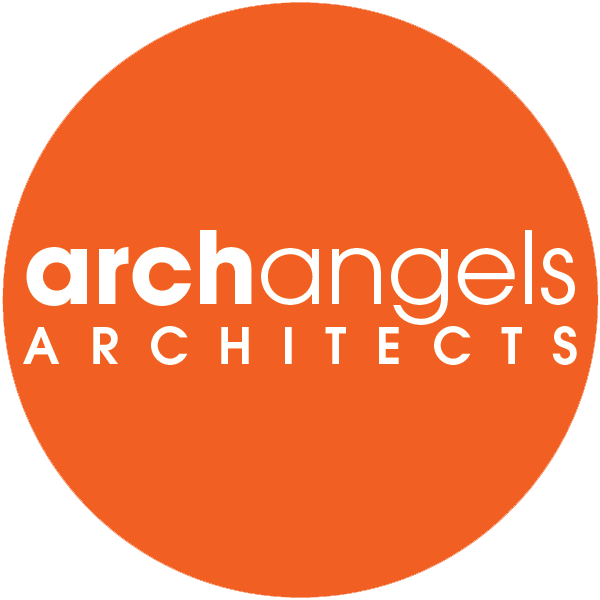how much does an architect cost?
Looking to understand how architects’ fees are calculated in the UK? This guide to architects’ charges should help give you an idea of how to budget for your project.
When you're thinking about embarking on a new design and build project it can be daunting trying to work out all of the likely costs involved, particularly if you've no background within the construction industry. There are a lot of different considerations that need to be taken into account depending on the precise scale and scope of the prospective undertaking.
So how do architects tend to charge and what will their fees cover? Read on to find answers to the common question, how much does an architect cost, along with general guidelines on project fees and what clients can expect working with archangels ARCHITECTS.
RIBA fee scales
Let's start by taking a look at the fee scale graphs produced by the Royal Institute of British Architects (RIBA) which have been commonly used to determine outline costs for an architect's involvement in different build projects. These fee scales were originally mandatory, so that architects, builders and clients would always have defined guidelines on project costs with minimal room to deviate from what should be charged.
The fee scale graphs would outline different project types and overall budgets, with a sliding scale to indicate the percentage of the total cost of works that the architect should charge. You can find an example RIBA fee scale graph here and whilst they are still in use today they've not been mandatory since the 80s and RIBA now consider them "an increasingly outdated method for calculating fees".
Whilst these fee scales may not be industry standard anymore, they're still a very useful way of judging likely costs for a build project and help keep all interested parties aligned.
How Are Architects Fees determined and Why Do They Vary?
Like any industry, the experience of the professionals you choose to engage will impact the costs. The rates charged should generally reflect the level of expertise provided.
Some architects will have particular specialisms such as being skilled working with listed buildings or designing with very high levels of sustainability in mind. You may therefore find these specialist architects can command higher fees than less experienced practices.
It's also worth considering the local expertise your architect can offer as having strong working knowledge of local planning laws, most of which are set by the local authority so can vary from county to county, can save a great deal of time and potential frustration further down the line.
typical fee calculations for architects today
Whilst there's no longer a tried and tested across the board fee structure adhered to by all UK architects, there are a number of common methods of determining architect fees and you should find the vast majority of architects use one or a combination of the below standard methods of charging.
Flat Fee
As the name suggests this is a simple single fee that is agreed in advance of a project and allows for easy budgeting as the fee proposed should be the final fee you pay. This can work for very clearly defined projects such as a relatively straightforward single-storey kitchen extension. However the lack of flexibility in this model means that often times when projects need to change in scope progress can be delayed as there's a need to renegotiate the originally agreed fee.
It might be the case that an architect would offer to work on a flat fee basis for initial work such as conducting feasibility studies and drawing up initial plans, then bill using another method of fee calculation if engaged further for additional stages in a project's realisation.
Flat fees for more involved and ambitious projects are typically very difficult to calculate accurately so it's advisable to be cautious should an architect quote a single one-off fee for an entire project from start to finish. After all there are often many unknown variables that only become apparent once construction has begun and these can naturally impact costs.
Hourly
Charging by the hour is a more familiar method of calculating project costs, much like is common with other professional services such as solicitors or management consultants. You'd engage an architect who would propose a standard hourly rate and bill for time spent working on the project.
This can offer greater flexibility than with a flat fee, as there's more scope to make adjustments along the way depending on how the project unfolds. However, with larger scale projects the costs can quickly escalate depending on how demanding of your architect's time the build becomes.
Often, depending on the size of the architectural practice you're working with, different levels of staff will command different fees based upon their seniority and experience. This can help with keeping fees lower for less demanding activities so you're not paying top rate for a senior architect to carry out administrative tasks for example.
Percentage of Construction Costs
This tends to be the most common method of determining architects’ fees in the UK today and has its roots in those RIBA fee scale charts we talked about earlier. By charging a standard percentage of the construction costs the fees can rise or fall in line with the costs of the build itself. This allows for ongoing designs and redesigns as the project scope changes over time.
Different architects will charge different percentages and this can also vary depending on the type of project being undertaken. They could be anywhere between 5% and 16% of the final construction cost and your architect will work with you to provide accurate estimates as to what that likely final cost might be, depending on the scope of your project.
Architects are bound by the Architects Code of Conduct so shouldn't be artificially inflating a project's construction costs to increase their own final fee received.
Hybrid of the Above
Most build projects are split out as per the RIBA Plan of Work framework which means that you architect may choose to use different methods to calculate your fees depending on the phase of work. So for instance there may be an hourly rate agreed for the first design drafts and initial studies whilst the Stage 2 Design phase would be charged on a flat fee basis.
This framework means that as a client you only commit to one phase of work at a time. You are free to dispense with your architect midway through the project, whether that's to find another architect or to continue the build without further ongoing architect input, and you'd only pay for the phase of work completed. You simply need to formally disengage your architect who in turn would be duty bound by the code of conduct to share their input up until that point with any new architect coming in to the project. It would fall upon the new architect to carry out due diligence on the project's scope to date, liaising with the original architect.
How and When Do Architects Bill for Work?
Many architects choose to quote their fees based on the RIBA Plan of Work stages so a typical example could be set out as follows: 30% of the total fee would align to stages 0-3 (strategic definition through to spatial coordination), with another 30% covering stage 4 (technical design) and the balance of 40% becoming payable for stages 5 and 6 (manufacturing & construction and final handover). You may also find your chosen architect will request a fee equal to half the initial survey fee upfront.
Working with archangels ARCHITECTS we always agree all fees in advance with your original detailed quote and fee proposal, so you'd know the schedule of payments due and amounts at each stage.
Example Architects Fees
It would be easy to say that determining architects’ fees is like asking how long is a piece of string as there are just so many variables at play, however we know that nothing beats cold hard numbers! Therefore we have come up with the below ballpark figures as guidelines for different common projects that we work on.
New Build
Your architects’ fees would typically be in the region of 7-10% of the total build cost for a residential new build design project. Construction costs of seven figures would attract a lower percentage fee whilst smaller projects would be closer to the higher end of the fee scale. So expect to pay circa £20,000 for your architect on a £200,000 build and in the region of £70,000 on a £1m development.
Listed Building Renovation
These projects tend to command higher fees than for new builds due to the more complex nature of plans needing to adhere to particularly strict planning restrictions. We'd usually recommend allowing between 12 and 15% of total build costs for architects’ fees in these projects, and again the percentage would be on the lower end of the scale the greater the total budget.
Reconfiguration of Existing House (unlisted)
These projects can be quite demanding compared to new builds and therefore fees range from between 10 and 14% based on overall build budget.
Two Storey House Extension
Depending on the existing building and available space we'd advise fees in the region of 9 to 13% of total construction costs for a house extension.
What Does an Architect's Fee Proposal Include?
Typically a residential architect will produce fee proposals for clients with detailed costs to cover the brief and all necessary expenses along with the schedule of work. You can find out more about the different stages in the schedule of work on our services page.
It’s worth remembering that fees quoted also have to allow for overheads as a practice including premises, staff costs, insurance and professional memberships.
In addition to the above many projects would be subject to fees from other consultants external to the architect such as structural engineers, quantity surveyors and energy assessment practitioners. You should expect guideline costs for those consultants your project is likely to require though their actual costs can vary and would be billed separately.
What Does Your Architect Deliver?
Your proposal covers the plans your architect will draw up with you, including 2D drawings as standard. Additionally, they can look at full 3D renders to help conceptualise your project.
Once plans are agreed, as per the plan of work project stages your architect will work with your chosen construction team to ensure the plans are realised as intended and can make adjustments along the way where necessary.
They will also support the project with planning application submissions, satisfaction of all necessary building regulations, technical drawings, liaison with external contractors, quality assurance and potentially identifying efficiencies and cost savings as appropriate.
What Budget Should You Allow?
No two projects are the same but clients who work with archangels ARCHITECTS would typically have a minimum total build budget of £150,000 to allow for materials, labour and consultants, exclusive of design fees. This is the lower end of the scale of construction projects we work on and in the past have supported builds of £1,000,000 and above at the other end of the spectrum. This will of course vary from practice to practice however.
The examples given above outline fees by project type.
What To Look For When Choosing an Architect
As with any significant investment undertaking, you'll want to do your homework before parting with any cash! Put some time into researching architects that are local, come recommended and who may have particular expertise with the work you are looking to do. For instance, archangels ARCHITECTS have a wealth of experience in designing additional storeys for bungalow extensions, in part due to our location on the coast in an area with a higher than average concentration of bungalows.
You should also consider the point at which the architect would expect you to pay for their time. Though many architects will offer a free initial consultation, there are some who would expect to charge to discuss your requirements in depth.
At archangels ARCHITECTS we don't charge for initial consultations with our clients, whether online or in person, however we do encourage clients benefiting from this service to make a donation to our charitable partner Sussex Nightstop. We're extremely proud of our partnership supporting the great work of Nightstop in helping to reduce the number of young homeless in the region.
How To Brief Your Architect
When you're in the early stages of trying to flesh out an idea for your build project it can be difficult knowing what you should have in mind to share with an architect. Having worked with hundreds of unique clients over the years, all with very different ideas of what might and might not be useful to provide us with, here are some of our most recommended considerations to have ready to share when briefing your architect.
It may sound obvious but we need to have an idea around your proposed budget. Sometimes a project just isn't going to get off the ground because expectations don't match reality with regard to actual costs. That's why first and foremost you need to know what you've got to spend, ideally with contingency on top.
We also need to understand your general goals. For example are you aiming to create more space in your family home? Or is the hope that you'll bring more light into a darker recess of your period property? Perhaps your primary requirement is improved access or maybe you simply want to build a brand-new home to move into that offers what your existing home cannot. We want to know what's motivating you to bring your project proposal to life so we can help realise your vision.
Have you thought about your preferred build materials? Sometimes local planning regulations will restrict what we can and can't use but other times there may be more flexibility and it's handy to know what materials you particularly like, for inside and out.
And finally, we always like to know what has inspired you. If you have examples of designs you really like the look of, or better yet if you've been keeping mood boards or have a Pinterest account full of inspiration, be sure to share!
Architects Fees in the UK in Summary
There's obviously no right or wrong way to determine architects’ fees in the UK and there's always going to be a huge variance in the scope of projects from one client to the next, just as there will be between different architectural practices across the country. However, hopefully this guide has helped broadly explain how fees are generally calculated for different builds.
If you’d like to know more about likely costs for a particular project you have in mind, we’d be happy to discuss your needs. Just get in touch with us today.
Additional Sources:
INSTAGRAM: @archangelsarchitects











